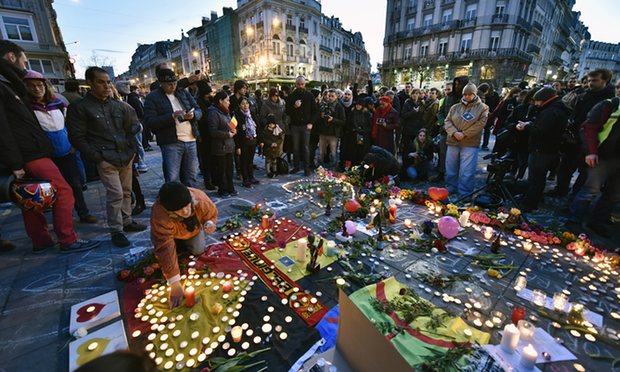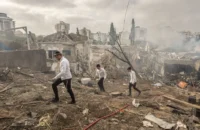As tragedy struck in the metro and the airport, with bombs killing at least 31 people and wounding many more – leaving devastation, grief and shock in their wake – on Tuesday 22 March Brussels joined the list of European capitals that have been targeted by indiscriminate jihadi terrorism. Four months on from the 13 November Paris attacks, the scenes of destruction, of bodies being carried away and of haggard and sometimes blood-stained survivors stumbling from wreckage, were reminiscent not only of pictures taken recently in the French capital, but also of the images from London in 2005, or Madrid in 2004.
Jihadi violence has evolved over the years, and the groups perpetrating it have morphed, with a shifting geographical focus, too, which often settles most ruinously on places in the Muslim world. But if there were ever any doubts thatEurope at large is being targeted by Isis, this latest onslaught will surely have set them aside.
Getting to the bottom of how this could happen, and where security failed, is of course essential. But as well as resilience and resolve, it is just as important that Belgium and its European partners maintain some perspective and keep a cool head. The rights and values that Europe avows will be tested by the way that its societies confront groups that want to sow death and division in their midst. To speak of “war”, and especially of a war potentially engulfing the whole of Europe, as the French prime minister Manuel Valls did hours after Tuesday’s attacks, sets dangerous traps while offering no convincing solutions.
The first reaction to these horrendous events must of course be one of total solidarity and empathy for the victims and their families. Brussels had been struck by fanatics before. On 24 May 2014 a gunman opened fire on the city’s Jewish museum, killing four people. Tuesday’s multi-pronged operation, involving at least one suicide bomber, was of a different scale. Another striking feature of the latest assault was its random nature. Anyone who might find themselves at an underground station or an airport hall, which is not so far from saying anybody at all, knows that they could have been a victim.
Whether the attacks were in any way a response to the arrest in Brussels, just four days earlier, of Salah Abdeslam, the suspected strategist behind last year’s Paris atrocities, is not yet clear. But the Belgian security services have certainly long been on high alert. “What we feared has happened,” said the Belgian prime minister, Charles Michel, describing a “black day” for his country. In the aftermath of the Paris attacks, Belgian authorities had combed through neighbourhoods, undertaken dozens of raids, and even locked down the capital for days. Earlier this year Interpol had warned that Isis was preparing another big attack in Europe.
Brussels may have been chosen because it has, fairly or unfairly, the reputation of being a weak link in counter-terrorism. Its Molenbeek suburb, where Abdeslam had been hiding before his arrest, is a neighbourhood known for its criminal networks as well as for radical Islamism. But this is not about just one city. Europe as a whole will necessarily feel alarmed – and not only because terrorists have now shown that they can set off bombs a short distance from the EU’s institutions.
Isis describes Europe not just as a region with cities of “depravity” (its description of Paris), but as an easy target because of its diversity and Muslim populations. Its twisted ambition is to trigger a form of civil war among Europe’s different communities. Integration and open societies are what it hates the most, and what it wants to destroy.
Isis is indeed fighting wars, sometimes with the west involved, in those Middle Eastern and African territories where the insurgency has taken hold. But it is not fighting a true war in Europe, and the continent should not talk itself into believing it is fighting one either. Mr Valls is wrong, and his words are dangerous. Talk of war amounts to handing Isis the victory it seeks. It is a vocabulary that lends Isis a certain and entirely unwarranted legitimacy, by casting it almost as a state.
A war narrative places unnecessary strains on Europe’s social cohesion and democratic fabric during peacetime. The suffering of the victims in Brussels must be acknowledged, and so too the scale of the challenge Europe faces in trying to secure a safer future for all. But a proportionate and carefully measured response will do more to rise to it than an impulsive reaction.



























